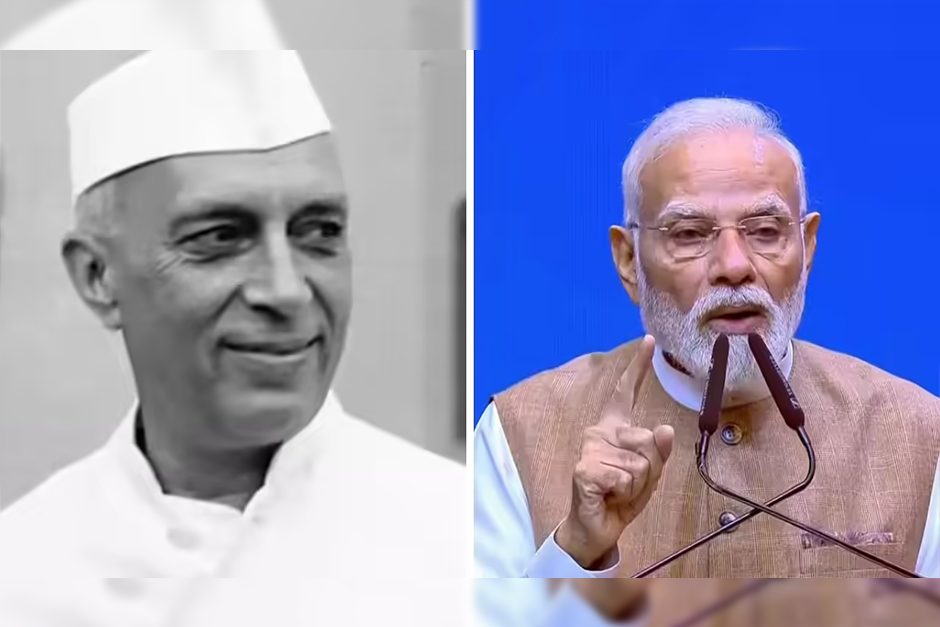In a fresh salvo aimed at the Congress party and its foundational leader, Jawaharlal Nehru, the Bharatiya Janata Party (BJP) has ignited a fervent historical debate. The ruling party recently accused India’s first Prime Minister of committing a “sin” by allegedly dropping stanzas dedicated to Maa Durga from the national song, Vande Mataram, back in 1937. This accusation comes coupled with a pointed “pungent echo” dig directed at Congress leader Rahul Gandhi, framing the historical event as a root cause for what the BJP perceives as a contemporary disconnect from India’s cultural ethos.
The Genesis of the Controversy: BJP’s Allegation
The BJP’s contention revolves around the 1937 session of the Congress Working Committee (CWC). According to the BJP’s official social media handles and spokespersons, it was during this crucial period that a decision was made under Nehru’s leadership to prune certain verses from Bankim Chandra Chattopadhyay’s iconic hymn. Specifically, the accusation highlights the removal of stanzas that overtly reference Maa Durga, depicting India as the divine mother goddess, a potent symbol of strength and reverence in Hindu tradition.
The BJP asserts that this act was not an innocuous editorial decision but a deliberate political choice. “It is a matter of profound regret and a historical sin that stanzas venerating Maa Durga, the very embodiment of Shakti, were deliberately removed from Vande Mataram in 1937 by Jawaharlal Nehru and the then Congress leadership,” a BJP spokesperson stated. “This act was not merely an editorial decision but a conscious erasure of India’s spiritual soul, echoed today in the anti-cultural stances of his descendants.” The party frames this alleged omission as a betrayal of India’s civilisational identity and an attempt to dilute its spiritual fabric for political expediency, thereby creating a historical precedent for what it views as cultural appeasement.
Vande Mataram’s Contentious Journey
Vande Mataram, penned by Bankim Chandra Chattopadhyay in his 1882 novel Anandamath, quickly transcended its literary origins to become a powerful anthem of the Indian freedom struggle. Its invocation of the motherland as a divine entity resonated deeply with nationalist sentiments, making it a rallying cry against British rule. However, its explicit references to Hindu deities, particularly Maa Durga, also became a point of contention, especially with certain Muslim groups and leaders who viewed it as idolatrous and reflective of Hindu majoritarianism.
It was this sensitivity that led to the significant CWC resolution in 1937. Mahatma Gandhi, Jawaharlal Nehru, and other prominent Congress leaders grappled with the task of adopting a national song that could unite the diverse populace of India. To address the objections raised, particularly by the Muslim League, the Congress decided to adopt only the first two stanzas of Vande Mataram for national gatherings, omitting the verses that were seen as exclusively Hindu in their iconography. This compromise aimed to foster broader inclusivity and unity, ensuring that the song could be sung without offending the religious sentiments of all communities. While this historical context explains the rationale behind the decision at the time, the BJP’s current narrative reinterprets it as an act of cultural capitulation and an affront to Hindu identity, rather than a move towards national cohesion.
The “Pungent Echo” and Political Ramifications
The BJP’s accusation extends beyond a mere historical critique, intricately weaving in contemporary politics by drawing a direct line to Rahul Gandhi. The “pungent echo” dig implies that Gandhi, as Nehru’s descendant and a prominent Congress leader, embodies a similar “anti-cultural” or “anti-national” sentiment today. This strategy serves a dual purpose: it allows the BJP to attack the dynastic legacy of the Nehru-Gandhi family, a frequent target, and simultaneously to project the Congress as being out of touch with India’s traditional and spiritual values.
By invoking the Vande Mataram controversy, the BJP aims to reinforce its image as the custodian of Indian culture and Hindu heritage, contrasting it with what it portrays as the Congress’s historical and ongoing appeasement politics. This narrative resonates particularly well with the BJP’s core voter base, allowing the party to frame present-day political disagreements within a larger historical and cultural struggle. Such accusations are designed to question the secular credentials of the Congress and to underline a perceived continuous disregard for indigenous cultural symbols by the opposition, effectively using historical interpretations to shape current public opinion and electoral discourse.
The latest broadside from the BJP against Nehru regarding the Vande Mataram stanzas and the subsequent dig at Rahul Gandhi underscore the enduring role of historical interpretations in contemporary Indian politics. The debate over national symbols, their origins, and their evolution continues to be a fertile ground for political contestation. While Vande Mataram remains a cherished emblem of national pride, its historical journey, marked by efforts at inclusivity and subsequent cultural re-examinations, highlights the complex interplay of tradition, identity, and political expediency that shapes India’s national narrative.




